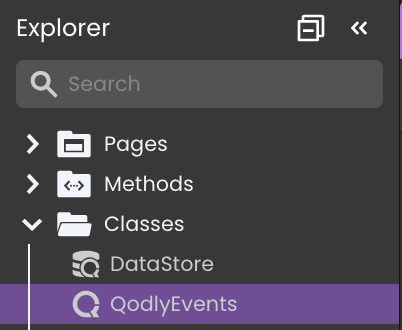QodlyEvents Class Interface
Overview
The QodlyEvents class interface provides a structured way to define application lifecycle logic in Qodly Server. It allows developers to implement startup and shutdown logic that is executed automatically when the server starts or stops.
Accessing QodlyEvents
The QodlyEvents class is visible under the classes folder in the explorer structure. By default, it appears greyed out until activated. Once activated, the class is created with predefined methods to handle application events.

When activated, QodlyEvents is initialized with the following structure:
shared singleton Class constructor()
shared function onStartup()
shared function onStop()
These methods enable the execution of custom logic when the application starts or stops.
Developers can modify the onStartup() and onStop() functions inside the QodlyEvents class interface to define custom behavior. For example:
shared singleton Class constructor()
shared function onStartup()
logEvent("Application startup completed successfully.", 0)
shared function onStop()
logEvent("Application is shutting down.", 0)
Automatic Execution of QodlyEvents
The onStartup() and onStop() functions execute automatically as part of the Qodly Server lifecycle.
Execution at Server Startup
When the Qodly Server starts, it automatically triggers the onStartup() function logic defined inside the QodlyEvents class interface by calling cs.QodlyEvents.me.onStartup():
-
This ensures that any initialization logic inside the onStartup() function is executed at startup.
-
Developers do not need to manually call cs.QodlyEvents.me.onStartup() in normal operations.
The onStartup() function is executed automatically before any remote connections can occur.
Execution at Server Shutdown
When the Qodly Server stops, it automatically triggers the onStop() function logic defined inside the QodlyEvents class interface by calling cs.QodlyEvents.me.onStop():
-
This ensures that any cleanup logic inside the onStop() function is executed at shutdown.
-
Developers do not need to manually call cs.QodlyEvents.me.onStop() in normal operations.